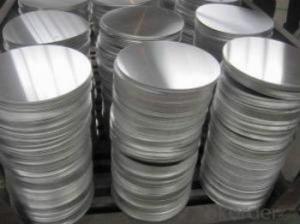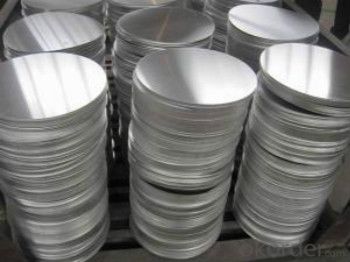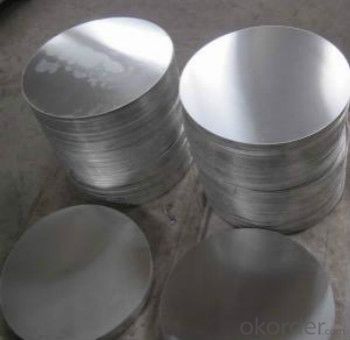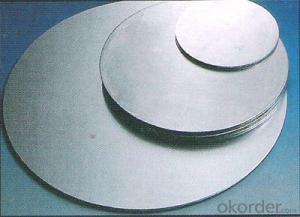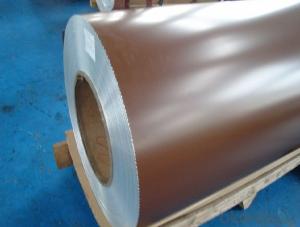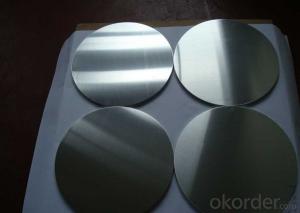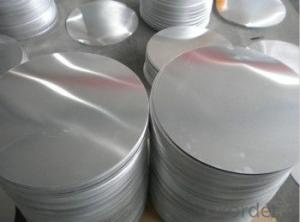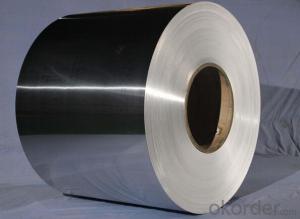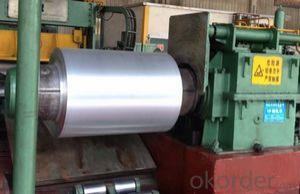3003 Mill Finished Continuous Casting Coil Aluminum Circle
- Loading Port:
- Shanghai
- Payment Terms:
- TT OR LC
- Min Order Qty:
- 5 m.t.
- Supply Capability:
- 2000 m.t./month
OKorder Service Pledge
OKorder Financial Service
You Might Also Like
Specification
1. Structure of CC Aluminium in Coil Form for making Aluminium Circle Description
CC Aluminium in Coil Form for making Aluminium Circle is one semi-finished aluminium material. This coil can be rolled down to aluminium coil,sheet,circle ect. The alloy AA1050 is widly used in building, industry ect. Its weight is much lower than steel. So many customers choosed aluminium material instead of steel.
2. Feature of CC Aluminium in Coil Form for making Aluminium Circle
Surfact Quality :
Be free from Oil Stain, Dent, Inclusion, Scratches, Stain, Oxide Dicoloration, Breaks, Corrosion, Roll Marks, Dirt Streaks and other defect which will interfere with use,
Mechenical Property:
Chemical Composite and Mechanical Property
3. Image of CC Aluminium in Coil Form for making Aluminium Circle
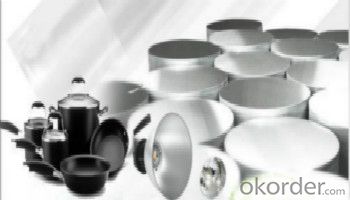
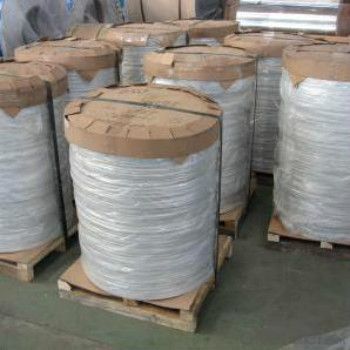
4. Specification of CC Aluminium in Coil Form for making Aluminium Circle
Aluminum Coil/Sheet | |
Main Specification | |
Alloy | AA1xxx (AA1050, AA1060, AA1070, AA1100 etc.) |
AA3xxx (AA3003, AA3004, AA3005, AA3105 etc.) | |
AA5xxx, AA6XXX (AA5052,AA5083, AA5754, AA6061, AA6062 etc.) | |
AA8xxx(AA8011, AA8006 etc.) | |
Temper | H14,H16, H18, H22, H24, H26, H32,O/F, T4, T6, T651 |
Thickmess | 0.01mm-100mm |
Width | 30mm-1700mm |
Standard | GB/T 3880-2006/ASTM |
Special specification is available on customer's requirement | |
5. FAQ
1) What is the delivery time?
Depends on actual order, around 20 to 35 days
2) What is the QC system:
We have QC staff of 20 persons and advanced equipment, each production is with MTC traced from Aluminum ingot lot.
3) What market do you mainly sell to?
Australia, America, Asia, Middle East, Western Europe, Africa etc
4)What about payment term?
30% T/T in advance, balance against B/L COPY.
- Q: Can aluminum coils be used in corrosive gas environments?
- Yes, aluminum coils can be used in corrosive gas environments. Aluminum has a natural oxide layer that provides excellent corrosion resistance, making it suitable for various corrosive environments including those with corrosive gases. However, it is important to consider the specific corrosive gas and its concentration, as certain gases may still have a corrosive effect on aluminum over time.
- Q: Can aluminum coils be used in aerospace heat exchangers?
- Yes, aluminum coils can be used in aerospace heat exchangers. Aluminum is a commonly used material in the aerospace industry due to its lightweight and high thermal conductivity properties. Heat exchangers are crucial components in aerospace systems, responsible for transferring heat from one medium to another. Aluminum coils are highly effective in conducting heat, making them suitable for use in aerospace heat exchangers. Additionally, aluminum is corrosion-resistant, which is important in the harsh environments encountered in aerospace applications. Its low density also contributes to fuel efficiency by reducing the overall weight of the aircraft. Therefore, aluminum coils are a preferred choice for aerospace heat exchangers due to their excellent thermal conductivity, lightweight properties, and resistance to corrosion.
- Q: What causes tower after cutting aluminum coil
- Insulation aluminum coil will appear when the cooling bending phenomenon, reason is generally under the conditions of air cooling, the heat transfer coefficient of the aluminum coil insulation parts in contact with the air were flat, but because the wall thickness or different shapes, different parts of the heat dissipation rate is not balanced, resulting in thick wall or hollow tube heat faster than the thin Department of slow, resulting in insulating aluminum roll cooling occurs to the hollow part.
- Q: Can aluminum coils be used for thermal insulation purposes?
- Thermal insulation purposes cannot be fulfilled by aluminum coils, as it is a metal with high thermal conductivity, facilitating heat transfer. Consequently, instead of preventing it, utilizing aluminum coils as thermal insulation would actually facilitate the transfer of heat. To achieve effective thermal insulation, materials such as fiberglass, foam, or mineral wool, which possess low thermal conductivity, are commonly employed. These materials establish a barrier that restricts heat transfer, thereby maintaining the desired temperature within a given space.
- Q: The question asks if magnetic induction can be used to inspect the quality of an aluminum coil.
- <p>No, you cannot use magnetic induction to inspect the quality of an aluminum coil. Magnetic induction is a method used to detect flaws or discontinuities in ferromagnetic materials, such as steel, by inducing eddy currents. Aluminum is not a ferromagnetic material, so it does not retain magnetism or support the formation of eddy currents in the same way. Instead, other non-destructive testing methods like ultrasonic testing or radiographic testing may be more appropriate for inspecting the quality of aluminum coils.</p>
- Q: What is the typical thickness of aluminum coils?
- The typical thickness of aluminum coils can vary depending on their intended use and application. However, in general, aluminum coils are available in a range of thicknesses, typically ranging from 0.006 inches (0.15 mm) to 0.25 inches (6.35 mm). The specific thickness required for a particular project or industry will depend on factors such as the desired strength, flexibility, and weight of the aluminum coils.
- Q: How does aluminum ingot be processed to aluminum coil (aluminum sheet)?
- First it should be made into blank and then put on the rolling mill.
- Q: Are aluminum coils suitable for construction purposes?
- <p>Yes, aluminum coils can be used for construction. They are valued for their lightweight, corrosion resistance, and high strength-to-weight ratio, making them ideal for applications such as roofing, facades, and structural components. Aluminum's malleability allows for easy shaping and forming, which is beneficial in various construction projects. It's also sustainable due to its recyclability, reducing environmental impact.</p>
- Q: Is it possible to construct furniture or tables using aluminum coils?
- <p>Yes, aluminum coils can be used to make furniture or tables. Aluminum is a versatile material known for its strength, durability, and lightweight properties. It can be easily bent and shaped into various forms, making it suitable for furniture construction. Aluminum coils can be used to create the frame or support structure of tables and other furniture items. They are also resistant to corrosion and require minimal maintenance, making them a popular choice for outdoor furniture and modern interior designs.</p>
- Q: Are aluminum coils suitable for heat exchangers?
- Yes, aluminum coils are suitable for heat exchangers. Aluminum is a highly efficient and effective material for heat transfer due to its high thermal conductivity. It can quickly transfer heat from one medium to another, making it ideal for heat exchangers where efficient heat transfer is required. Additionally, aluminum coils are lightweight, corrosion-resistant, and have excellent durability, making them a popular choice for various applications, including heat exchangers. The corrosion resistance of aluminum ensures that the coils can withstand harsh environments and prevent the formation of rust or corrosion, prolonging the lifespan of the heat exchanger. Moreover, aluminum coils are easily moldable and can be formed into various shapes, allowing for flexibility in design and construction of heat exchangers. This versatility makes them suitable for a wide range of applications, including HVAC systems, refrigeration units, and automotive cooling systems. In summary, aluminum coils are well-suited for heat exchangers due to their high thermal conductivity, lightweight nature, corrosion resistance, durability, and versatility. These properties make aluminum coils an excellent choice for efficient heat transfer in various industries.
Send your message to us
3003 Mill Finished Continuous Casting Coil Aluminum Circle
- Loading Port:
- Shanghai
- Payment Terms:
- TT OR LC
- Min Order Qty:
- 5 m.t.
- Supply Capability:
- 2000 m.t./month
OKorder Service Pledge
OKorder Financial Service
Similar products
Hot products
Hot Searches
Related keywords
